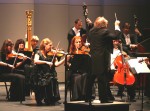Although pianist Alessio Bax has performed the works of classical musicians for decades, from studies at the Italian conservatory to his debut appearance with the Los Angeles Chamber Orchestra, he strives each time to get closer and closer to the composer’s original intentions.
Bax and the orchestra will perform at Royce Hall this Sunday under Austrian composer Hans Graf, displaying a hometown rendition of classical works.
Including performances of Henri Dutilleux’s “Mystère de l’instant,” Mozart’s “Piano Concerto No. 24 in C minor,” and Beethoven’s “Symphony No. 6 in F major ‘Pastoral,'” the evening will commence with pre-concert interviews of Graf and Bax, conducted by Andrea Laguni, LACO’s general manager. Afterwards, the 40-member orchestra with a 45-year history will take the stage under Graf for the first time.
“Sunday is a unique opportunity for this class of musicians from the whole world to come together and put out a memorable performance,” said Laguni, who has been with LACO since 1995. “Performing Beethoven and Mozart with Hans Graf is almost like being genetically in contact with the DNA that created that music.”
Graf will oversee the orchestra and Bax, though Bax tours the world 11 months a year under a variety of conductors.
“When you get a great orchestra together like the LACO,” Bax said. “A conductor like Hans Graf provides the perfect recipe to do what you want to do, improve yourself, improve your conception of the piece and to be further inspired.”
Bax started playing piano at a young age. His parents, Italian musicians, gave him a small electric keyboard as a childhood Christmas gift; subsequently sparking what has now evolved into a 20-year career of global performance.
“Growing up as a boy in Italy, as soon as I realized that I was not going to be a soccer star, this keyboard fell into my lap and I just fell in love with it.” Bax said. “We have so much great music written for the piano. I think a lifetime is not enough to explore all possibilities.”
Characterized by a dramatic range of emotions, Mozart’s “Piano Concerto No. 24 in C minor,” consists of three movements of instrumental collaboration.
“There is a first, largest movement that is very classical in style followed by a very slow, intimate second movement which is special for the orchestra because in the woodwinds, they have incredible solo parts,” Bax said. “The third movement is a set of variations. There is a very simple theme and quick dramatic succession of very contrasting movements based on that same theme.”
Throughout the performance, Bax will improvise on the piano, and members of the orchestra will perform solos, creating a layered sound.
“Beethoven’s Symphony No. 6 in F major, ‘Pastoral,’” has this sort of narrative that accompanies the contact with nature and good relationship that one has with the earth,” Laguni said. “It is quite interesting that after 200 to 300 years, this is a more essential topic of our existence than ever before,” he noted.
Violinist Tereza Stanislav will step in as concertmaster on Sunday’s performance, heading the first violin section. Stanislav, who studied music at Indiana University, will lead the orchestra alongside Bax and Graf.
“It is great to have this opportunity to perform the influential work of history’s great minds in front of young musicians at the university level,” Stanislav said. “The friendships and relationships I created while studying music in college were essential in forming my music identity and maturing my skills.”
Bax and Stanislav both agreed that chamber music is best experienced in an intimate acoustic setting.
“A lot of the music that we play, especially our chamber music was meant to be played in living rooms, literally. That’s where it started,” Bax said. “The venues then began to grow larger and larger and when you have the whole orchestra involved, you need more space.”
The LACO has considered Royce Hall its home for decades, and the orchestra includes musicians from Los Angeles, across U.S. and abroad, Laguni said.
“Classical music is not something that you listen to once and say ‘oh, that’s pretty’ and that’s it,” Bax said. “When you go back and listen again, you find different layers so it becomes more rich, interesting and much more rewarding.”
